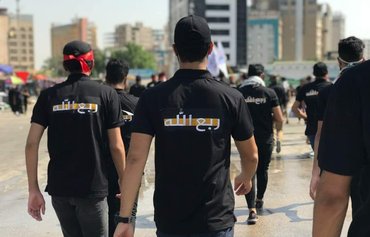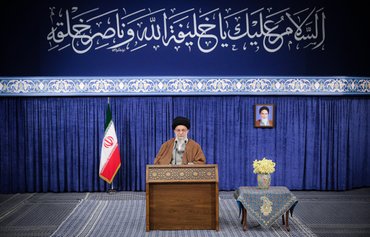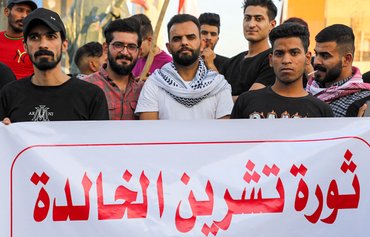A new religious-political movement backed by Iran, Ahd Allah, has met with widespread popular rejection in Iraq, where it is perceived as being part of an Iranian effort to disrupt Iraq's early elections, observers told Diyaruna.
Iran has been supporting the formation of new political blocs and movements with the aim of influencing the upcoming parliamentary elections, which were moved forward to June 2021 partly in response to protestors' demands.
Iranian efforts have come in response to the emergence of a number of youth and civil movements fueled by the popular demonstrations, which also seek to participate in the elections and effect change in the country's governance.
In Ahd Allah's founding statement, Shia cleric Hashem al-Haidari claimed that members of the movement would be the "Iraqi children" of Iran's Supreme Leader Ali Khamenei and the late Ruhollah Khomeini.
The movement upholds the doctrine of Wilayat al-Faqih (Guardianship of the Jurist), which calls for allegiance to Khamenei, and intends to adhere to the path carved out by his predecessor, Khomeini.
According to the founding statement, "Khomeini's path does not pertain to only one country, ethnic group or populace to the exclusion of others".
Widespread popular rejection
Ahd Allah has met with widespread popular rejection in Iraq, where it is seen as an extension of other Iran-aligned movements, such as Kataib Hizbullah and Rubu Allah.
The movement aims to disrupt the elections and confuse voters, Iraqi Civil Movement member Ali al-Darraji told Diyaruna.
It is not in compliance with the election law because it presents itself with an Iranian identity, he said, and advocates the establishment of Wilayat al-Faqih in Iraq, a country that is home to multiple sects, religions and ethnic groups.
Iraq governs solely on the authority of its constitution and law, he said.
Al-Darraji said similar movements and political blocs are expected to be announced, with the ultimate goal of misleading voters and undermining the civil forces and political candidates that emerged from the protest movement.
He noted that al-Haidari had previously appeared in photos alongside Khamenei, pointing out that this movement can only be viewed as an Iranian movement with a new face.
Iraqi politician Ghaith al-Tamimi said movements like Ahd Allah are being formed as part of a strategy through which Iran seeks to create a maelstrom of names and armed movements and groups with a sectarian agenda.
These aim to confuse Iraqi voters, he told Diyaruna, urging Iraqis not to pay them any attention.
"It is great to see the birth of this movement mocked, as it shows the Iraqi people are aware of the dangers of the Iranian regime's interference in the country," al-Tamimi said.
A 'new hatch' for the IRGC
Iraqi Communist Party member Falah al-Janabi said the establishment of new movements and militias linked to Iran will have serious consequences for Iraq, because they pursue agendas that conflict with the government's approach.
"The increase in the number of parties and militias increases the problems in Iraq, and this is evident from their impact on the relationship between Baghdad and other countries of the world," he told Diyaruna.
These movements are working "to isolate Iraq", he said.
He called on the government to "force those parties to comply with the Iraqi political parties law, and enforce the law on them if they commit any crime or act that conflicts with the state's policy or harms its interests".
Iraqi affairs researcher Fuad Ali described Ahd Allah as "a new hatch" through which the Islamic Revolutionary Guard Corps (IRGC) seeks to enter Iraq.
Iraqi citizens are waiting for a solution to their economic, services, back salaries and security-related problems, he told Diyaruna.
But Iran continues to inject more movements into Iraq that call for the establishment of Wilayat al-Faqih, he said.
But it is not as if Wilayat al-Faqih has succeeded in Iran, where people are dying of hunger and neglect and gripped by fear and tyranny, he added.
"Unemployment is rampant in Iran, and people there are faring no better than the Iraqi people," he said.

![Iraqi youths carry a national flag as they walk past a mural in Baghdad's Tahrir Square on October 28th, during a cleanup operation by security forces allowing roads around the city centre, the scene of anti-government and anti-Iran protests, to reopen. [Ahmad al-Rubaye/AFP]](/cnmi_di/images/2020/11/17/27042-Iraqi-youth-flag-600_384.jpg)







All those names that are rejecting Iran and the presence of factions and movements are all, firstly, distant from religion. Secondly, they aren’t patriots; they’re just after their own interests and this is related to their work as agents for America. As to Iran, it’s a matter of sect. The other thing is that Iran as a country has helped Iraq fight the "Islamic State of Iraq and Syria" (ISIS) when all countries were sending terrorists. As to the factions, they’re Iraqis that are linked by sect only.
Reply3 Comment(s)
The people there are hundreds times better off.
Reply3 Comment(s)
"‘Unemployment is rife among them, and the people there aren't better off than Iraqis," he noted.
Reply3 Comment(s)